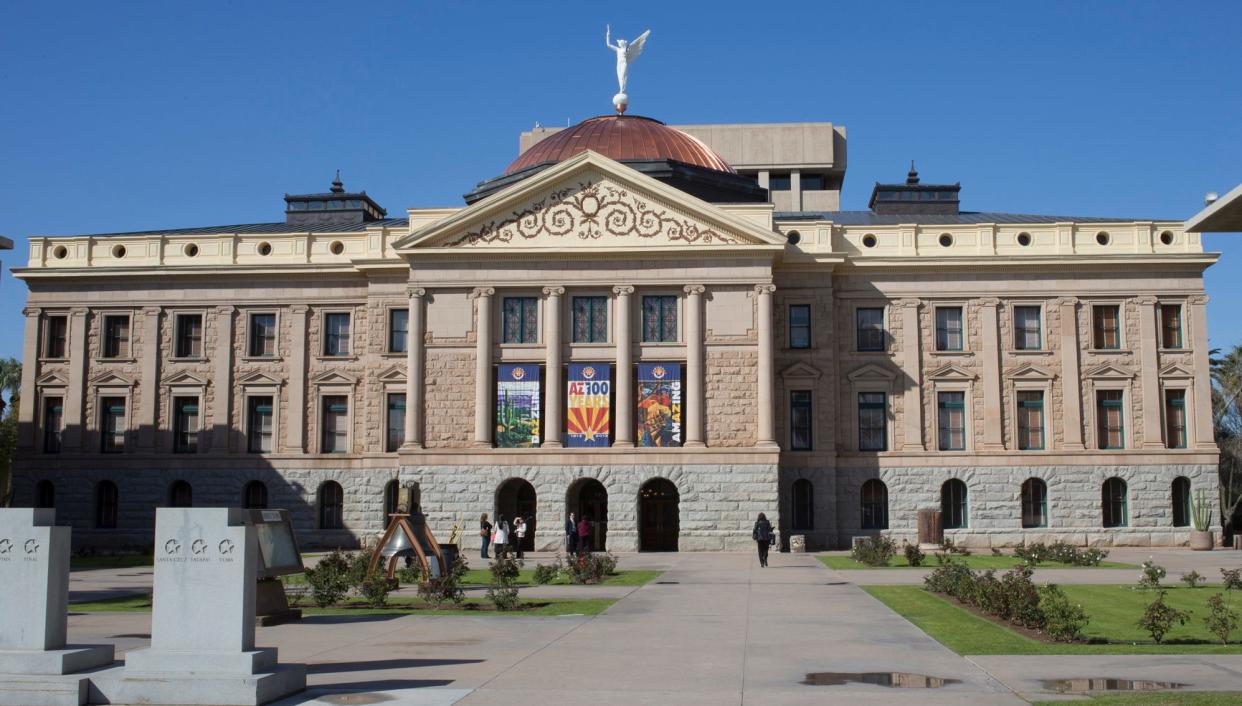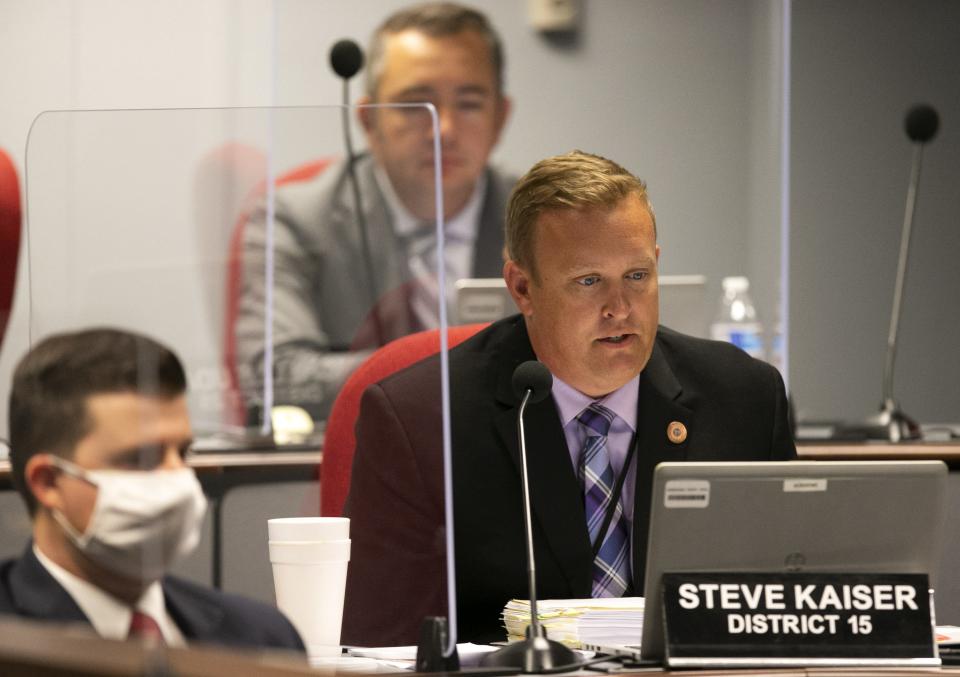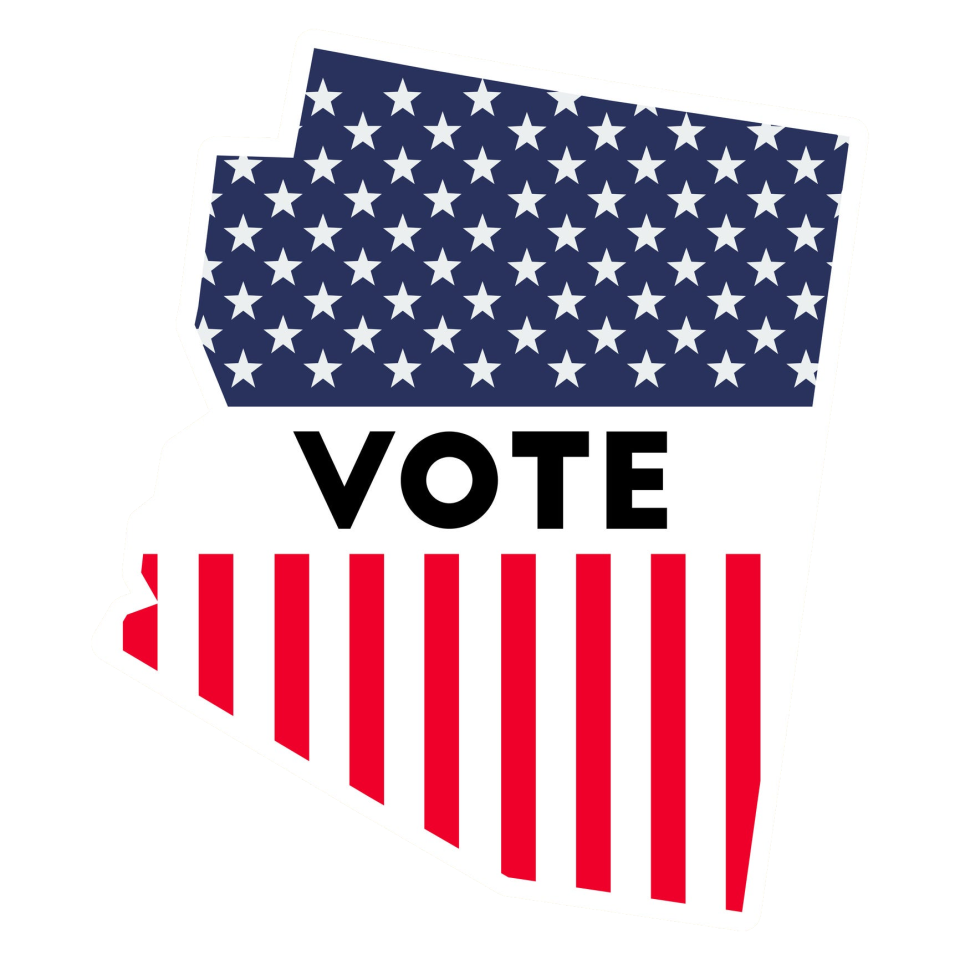Arizona District 2 Senate race: Newcomer Jeanne Casteen, incumbent Steve Kaiser talk issues

- Oops!Something went wrong.Please try again later.
Voters have until Nov. 8 to decide who will fill the 30 open seats in the Arizona Senate, where election winners will go on to craft policies around issues ranging from voting rights to abortion over the next two years.
In northern Phoenix's Legislative District 2, Democratic challenger Jeanne Casteen is up against Republican lawmaker Steve Kaiser in what's expected to be among the most competitive races this year.
The newly-formed district has an almost equal share of Republicans and Democrats, with right-leaning voters representing only a slight majority.
Kaiser has served in the Arizona House of Representatives since 2021 and hopes to swap his current seat for one in the state's Senate chamber. Casteen is a longtime schoolteacher whose main priorities revolve around education reform.
Residents must be registered to vote by Oct. 11 and can check their status on the Arizona Secretary of State’s website. Those who choose to vote by mail should send in their ballot by Nov. 1 or drop it off at a voting location by 7 p.m. on Election Day, Nov. 8.
The Arizona Republic asked both candidates to share their views on key state issues to help voters decide who to elect.
Top priority
If you are elected, what will be your top priority while in office, and what would you do about it?
Casteen (D): When I am elected, my first priority will be education and I will introduce legislation to fund full-day kindergarten for students throughout the state.
Kaiser (R): My top priority will continue to be focusing on ways to make Arizona prosperous and affordable for everyone. The best way to do both of those goals revolves around job creation to meet workforce needs and making sure everyone can afford a home within their budget. To that end I have worked extensively among other things, to help adult Arizonans attain a high school diploma and a trade certificate so that they can start a career. I have also led the Housing Supply Study Committee to find out what is driving the sky high rent increases and keeping people out of owning their first home, and what the state can do to address it.
Education
Casteen: While I believe this will move us in the right direction, it doesn’t fully address the issues facing our schools like the teacher retention crisis. Teachers, like my daughter, are choosing to move out of state rather than teach here because of the disrespect and low pay.
Additionally, without raising the AEL so that districts can actually spend that money, it's an empty promise. There should be nothing preventing our schools from spending the money they have been given to spend, especially legislation as antiquated as the AEL.
Kaiser: Every year that I have been at the Legislature I have voted for increasing education funding. I am also advocating for a new program called the Pay Teachers First plan. This plan will give a $10,000 increase in salary to every teacher in Arizona. What's different about this plan is that the bill will bypass the school districts that put too much money in administration, and will give it directly to teachers. I also believe that our current education finance system needs to be reformed through a study committee process due to its complexity and importance. Our education system is changing rapidly from where we were even 25 years ago. Regarding the AEL, I would argue for getting rid of it. The Legislature's job is to allocate resources and the members should be able to decide what is needed for education.
Do you support the school voucher expansion that passed this year and would you seek to modify it?
Casteen: I would not have supported expanded vouchers for unaccountable private schools if I was in the Legislature and I have been working to collect signatures in order to refer it to the ballot. The people of Arizona already said they do not want this — by a 2 to 1 margin — in 2018 when they voted No on Prop 305.
Kaiser: I believe that the passage of the empowerment scholarship account will unlock amazing educational freedom of choice for all children. No longer will only wealthy families have the option of private school. This will also create innovation in the education space, something that is desperately needed. We need to recognize that not all children will be best supported in a one-size-fits-all system. I find it fascinating that the group trying to keep the status quo one-size-fits-all system fell short thousands of signatures from the public when they tried to stop this. Arizonans understand how important educational freedom is and they did not want that taken away by a special interest group.

Elections and voting rules
Casteen: No. Our elections are safe and secure.
Kaiser: I believe that as a Legislature we have addressed many of the issues in our election system over the last two years. Improving our elections process should be an ongoing task, and it's important to always be focused on improving current processes. People should feel secure that their vote counts.
Do you support mail-in voting?
Casteen: Mail-in voting is safe and secure and is the choice of the vast majority of Arizonans of all political parties.
Kaiser: I first started using mail-in voting when I was stationed in Georgia with the Army when I wanted to keep my Arizona registration. I continued to use mail-in voting when I was deployed to Afghanistan in 2008. I have been voting by mail ever since my return from that deployment. I like to have all the materials in front of me as I vote at my kitchen table. I like that I can track my ballot to make sure it was received.
Do you believe that the Legislature has plenary power, or should obtain the power, to overturn elections?
Casteen: The Legislature should not have the ability to reject the will of the voters and choose the winners of an election.
Kaiser: I believe our current system as established by our state Constitution and US Constitution is the correct method for handling elections. I don't read either document as saying that the Legislature can overturn the votes of the people when it comes to elections. The citizens of Arizona vote and the electors cast their vote based on the popular vote of Arizona.

Election guide: November 2022
City races | School boards | State | Governor
| Ballot measures | Federal races | How to vote
Water resource management
Casteen: We must find new ways to save water and must make sure that all of our water is accounted for and regulated so that companies cannot get away with pumping unlimited amounts of valuable groundwater.
Farming uses approximately 80% of Arizona’s water. We need to incentivize farmers to switch to more efficient ways of watering their crops, like switching to drip irrigation.
Reducing water use: What Arizonans should take away from latest Colorado River drought guidelines
Kaiser: Unfortunately, Arizona is at the bottom, or lowest priority, when it comes to the Colorado River Basin states allocation of water. We should advocate at the federal level for higher status as our population is booming compared to the other states. We should also look at helping California or Mexico open more desalination plants in exchange for some of their allocation of water. However, that only addresses how to get more water. The other part of this equation is how do you conserve more of what you have.
We have massive opportunities for more conservation. Agriculture takes up the lion's share of water, around 75%. What can we do there to improve efficiency? Drip irrigation could help conserve water, but I would want to work with Arizona's farmers to find ways to be more efficient — they are the experts when it comes to water use and their opinion should be held in high regard.
Social issues and immigration
Casteen: I strongly support protecting access to abortion and reproductive health care because the government shouldn’t be making reproductive health care decisions. I am an ardent supporter of the LGBTQ community. They have been under continuous attack by our current legislative majority. I will make sure that they have the exact same rights as every other person in Arizona.
Kaiser: Parents rights in education is something I am very passionate about. I want parents and teachers to have a very strong relationship. I want both groups to fully respect each other. What we are hearing and seeing from some parents is an inability to get access to what their children are learning. Teachers should not conceal anything from parents, unless there is evidence of abuse or neglect, that must be reported to authorities. But, in most cases parents and teachers do not have a strong relationship because they do not meet often enough. Parent-teacher conferences should be more frequent and should be at times when working families can attend. Let's strengthen the parent-teacher relationship as it will produce amazing results for the student!
Casteen: We need to treat the border issue with humanitarian concerns first and foremost, with compassion and understanding rather than anger, fear and untruths about who and what is crossing the border. The border issue is real people fleeing unlivable circumstances in their home countries.
Kaiser: As the Legislature we need to continue to invest in resources to stop human and drug trafficking happening at the border. Physical walls do work and should be expanded. The physical walls funnel the trafficking to other areas that have easier access to cross and so the limited staffing of Border Patrol agents can be more efficiently used at those areas. We also need technology to help find traffickers of drugs and people, so additional resources there as well would be beneficial. Too many Arizona children have died from fentanyl and we as a state need to come together to address where it is coming from, which is our open southern border.
Economics and state spending
Casteen: I think that the Legislature should try to help ease inflation. I'm eager to learn what we can do locally, to stop legislation that serves the ultra-rich while regular working middle-class and lower-earning people are especially hard hit AND ignored.
By fully funding pre-k and full-day kindergarten, we can lower the price of child care and provide more money in families’ pockets at the end of the month.
Kaiser: Yes, absolutely the Legislature should help as much as possible to ease inflation. Of course, inflation is caused by over-printing of money in Washington combined with supply chain issues, but there are steps we can take to put more money in Arizonans pockets to help blunt this awful economy. First thing we should do is ban any city from enacting a grocery tax or a rental tax. The state does not have these taxes but many cities do and they disproportionately hurt low income families. We should also let Arizonans keep more of their paycheck by eliminating the personal income tax. These measures will help Arizonans stretch their hard earned money a little further during these horrible economic times.
Casteen: I would use the surplus to create full-day kindergarten and universal pre-k programs so that we can provide an education to younger children. We could increase teacher pay and provide incentives for those with teaching certificates to return to the classroom. Actually provide funding for our community colleges and universities.
We can give every child access to health care by expanding KidsCare.
Kaiser: If you have a surplus as a government it means that the government is taxing the citizens more than what is needed to run the government. As stewards of the state's resources we at the Legislature must also be prudent in what we invest in. I believe that we should use the surplus to pay our teachers a raise as mentioned above. We should also use a large majority of that surplus for an income tax reduction for all Arizonans, as close to zero as possible. We should also use the surplus to invest in our infrastructure to meet the demands of population growth. Finally, a wise investment of the surplus should go to water conservation planning.
Reach Sam at sam.kmack@arizonarepublic.com. Follow him on Twitter @KmackSam.
Support local journalism. Subscribe to azcentral.com today.
This article originally appeared on Arizona Republic: AZ Senate: District 2 hopefuls Jeanne Casteen, Steve Kaiser on issues

